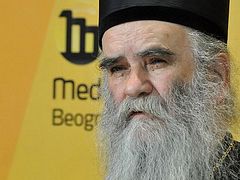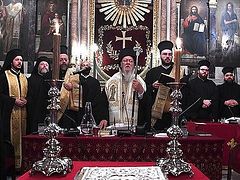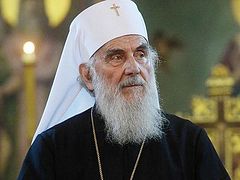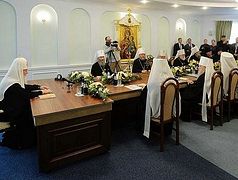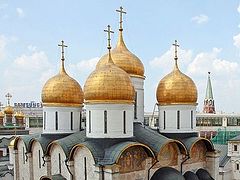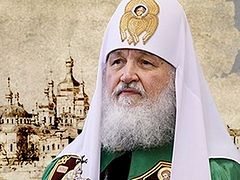Piraeus, Greece, October 23, 2018
His Eminence Metropolitan Seraphim of Piraeus (Greek Orthodox Church) has published his view on the Ukrainian matter following the Holy Synod of Constantinople’s October 11 statement that announced its decision to restore the anathematized Philaret Denisenko of the schismatic “Kiev Patriarchate” and Makary Maletich of the schismatic “Ukrainian Autocephalous Orthodox Church” as clergy and reclaim Ukraine as its territory, which it ceased to be in 1686.
His full statement appears on the Greek portal Romfea, with the main points reproduced on Sedmitza.
He also spoke out a month ago, warning the Ukrainian government that the Church must not be involved in geopolitical games, stating, “You are playing a terrible geopolitical and geostrategic game between NATO and the Russian Federation, so understand that these things cannot be used as tools in the Church.”
Without questioning the Ecumenical Patriarch’s primacy of honor, and acknowledging the first throne’s canonically justified right of “honorary chairmanship at an Ecumenical Council and coordination of the Orthodox Churches,” Met. Seraphim offers a significant clarification on the authority of the Patriarchate of Constantinople.
The Greek hierarch writes that Constantinople has the right to grant autocephaly or autonomy at the request of the canonical Church structure, having in view its approval at a future Ecumenical Council. He notes that the debate about the procedure for granting autocephaly has been going on for 50 years, and this point, the agreed upon principle he refers to includes three elements: the petition of a canonical Church, the agreement of the Mother Church, and the approval of the other autocephalous Local Orthodox Churches.
The Ecumenical Patriarchate previously agreed to these principles in its official position on autocephaly and autonomy, and in the 1993 pre-conciliar agreement of Chambésy, Switzerland, November 1993.
The above principles do not give Constantinople the right to grant autocephaly in the case of Ukraine, Met. Seraphim writes, as the Kiev Metropolia was transferred to the Moscow Patriarchate in 1686, and thus the Church under His Beatitude Metropolitan Onuphry of Kiev and All Ukraine is the only canonical structure in Ukraine today, and it does not want autocephaly.
As the Greek metropolitan writes, autocephaly in Ukraine is sought by the “Westerner and Uniate” President Poroshenko, the Ukrainian Parliament and the nation’s two schismatic structures.
He also argues that Constantinople’s actions—sending two Exarchs to Kiev and deciding to grant autocephaly without specifying who the recipient of the tomos will be, ignores the position of the canonical Ukrainian Church.
Met. Onuphry and the Ukrainian Church strongly protested Constantinople’s sending of Exarchs into its canonical territory; the Ecumenical Patriarchate did not listen, but only insisted on its right to act in Ukraine as it pleases.
Met. Seraphim also strongly critiqued Constantinople’s recognition of two schismatic Churches and their primates, which are not recognized by any Church, arguing that Constantinople’s “right” to remove ecclesiastical sanctions placed by another Local Church requires critical analysis from the standpoint of canon law.
He writes of an historical case, where Pope Zosimus of Rome (reigned from March 18, 417 to Dec. 26, 418), referring to Canons 3, 4, and 5 of the Council of Sardica, tried to justify his right to be the supreme judge for the Church of North Africa and restore the priest Apiarius of Sicca who had been excommunicated by Bishop Urban. The African bishops strongly rejected Pope Zosimus’ claims, with their rejection then being confirmed in the resolutions of the Council of Carthage.
“The undivided Church recognized that the Canons 3, 4, and 5 of the Council of Sardica, which Pope Zosimus relied on, gave the Pope of Rome the right to judge only over those bishops subordinated to him. Thus, the Church rejected the claims of the Pope’s right of supreme Church-wide arbitration,” Met. Seraphim argues.
He also emphasizes that the decision of any autocephalous Holy Synod can be revoked only by the local Synod or an Ecumenical Council:
The decision of any Holy Patriarchal Synod … cannot be revoked (Balsamon and Photios speak about this in the “Nomocanon”). It can be appealed only by an Ecumenical Council. St. Nikodemos of the Holy Mountain also refers to Canon 9 of the Fourth Ecumenical Council (‘…the Patriarchate of Constantinople cannot act in the dioceses and provinces of other Patriarchates’). It should also be noted that Metropolitan Isaac of Ephesus told Emperor Michael Palaeologus that the authority of the Patriarch of Constantinople does not extend to the Eastern Patriarchs.
Given the above arguments, Met. Seraphim concludes, “The canonical right to review the case of Monk Philaret Denisenko, considered by the full Patriarchal Synod of the Moscow Patriarchate, belongs only to an Ecumenical Council, especially given that in his letter No. 1203 of 8/26/1992 to Patriarch Alexei of Moscow, the venerable Ecumenical Patriarch agrees with the decision handed down.”
Philaret Denisenko himself appealed to Pat. Bartholomew in June 1992, soon after the Russian Church’s decision to defrock him. Pat. Bartholomew’s ensuing August letter reads:
In response to the corresponding telegram and letter of Your greatly beloved and honorable Beatitude on the problem that has arisen in Your Holy Russian sister Church that led her Holy Synod, for reasons known to her, to the deposition of the until-recently leading member of her Synod, Metropolitan Philaret of Kiev, we desire to fraternally inform Your love, that our Holy Great Church of Christ, recognizing the fullness of the Russian Orthodox Church’s exclusive competence on this issue, synodally accepts the decisions regarding the one in question, not desiring to bring any trouble to Your Church. It is precisely in this spirit that we sent two brothers, His Eminence Metropolitan John of Pergamon and His Grace Bishop Vsevolod of Skopelos, after a visit to us by the one in question who has been deprived of his office, that we could be directly notified firsthand of what had occurred and avoid a misinterpretation in the given case. Consequently, we should note that we were grieved when we learned that there was not a full understanding of the purpose of their mission.
Pat. Bartholomew later reaffirmed this stance in 1997 in another letter to Pat. Alexei, where he writes, “Having received notification of the mentioned decision, we informed the hierarchy of our Ecumenical Throne of it and implored them to henceforth have no ecclesial communion with the persons mentioned.”
Follow us on Facebook!


